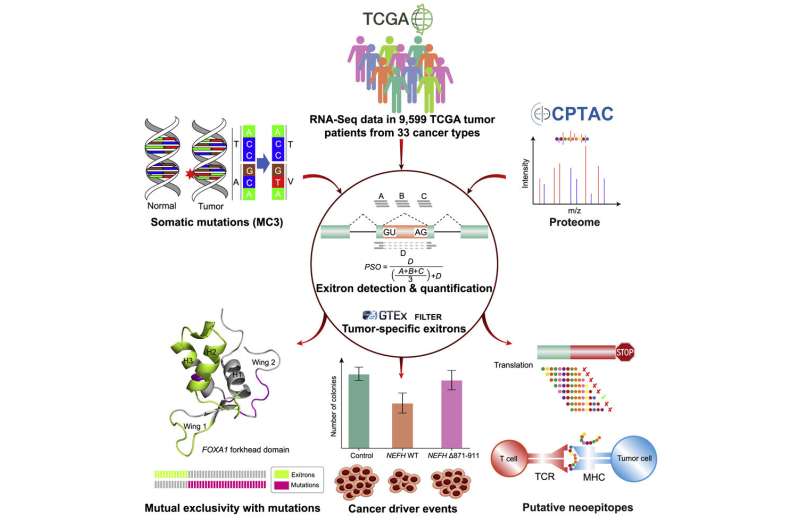Uncovering epigenetic mechanisms underlying cancer development

Northwestern Medicine studies published in Nature Cell Biology and Molecular Cell are improving the understanding of epigenetic mechanisms in cancer development and progression, as well as pinpointing genes that drive the development of cancers, which may help identify patients who will benefit from immunotherapy. The research was led by Qi Cao, Ph.D., associate professor of Urology.
Studying Cancer-Related Translational Regulation
Northwestern Medicine investigators have discovered a previously unidentified role of a protein that is essential in regulating cancer development and progression, according to a study published in Nature Cell Biology.
The study also highlights a potential therapeutic target for treating solid tumors, such as those found in prostate cancer and breast cancer, according to Cao, who was senior author of the study.
"The novelty of this study is that we found the function of EZH2 at a translational level. We call this a 'non-canonical' function of EZH2," Cao said.
Yang Yi, Ph.D., research assistant professor of Urology, and Qingshu Meng, Ph.D., a postdoctoral fellow in the Cao laboratory, were co-lead authors of the study.
EZH2 is a well-known oncogene found in solid tumors and has also been identified as a transcription repressor—EZH2, the protein, binds to specific sites on DNA, blocking the transcription of surrounding genes into mRNA. However, the underlying mechanisms involved in EZH2's role in regulating oncogenesis and overall cancer development have remained unknown, according to Cao.
In the current study, the investigators utilized ribosome profiling technology to analyze active ribosomes in human prostate cancer cell lines. They discovered that EZH2 regulates two crucial RNA modification and translation processes in the cancer cells: impairing one kind of methylation and reducing a specific form of translation initiation in the ribosome.
The findings suggest EZH2's dual role in regulating transcription and translation in EZH2-high cancer cells promote cancer progression by accelerating ribosome functions and contributing to cancer-related translational control, according to the authors.
Moreover, targeting EZH2 by ridding it of its non-methyltransferase roles may be an effective therapeutic approach to treat solid tumors. This new approach would be encouraging, as current EZH2-targeting strategies primarily focus on inhibiting the lysine methyltransferase activity of EZH2, which previous work has found does not completely inhibit solid tumor progression, according to the authors.
"Our results revealed the significance of the non-lysine methyltransferase role of EZH2 in oncogenesis, which could provide distinctive perspectives for the development of EZH2-targeting strategies specialized in the elimination of its non-methyltransferase roles," the authors wrote.
Genes enriched with exitron splicing (EIS) have the capacity to act as a driver of cancer development and may serve as promising therapeutic targets, according to findings published in Molecular Cell. Cao and Qi Liu, Ph.D., a postdoctoral fellow in the Cao Laboratory, were co-authors of the study.
RNA splicing is a process in which newly made mRNA is transformed into mature mRNA. During this process, introns (non-protein coding regions of RNA) are removed, and exons (protein-coding regions of RNA) are joined together.
An alternative type of RNA splicing is EIS, in which some introns usually cut out of an RNA sequence are preserved, which creates a "cryptic intron" called an exitron, an RNA sequence that results in altered protein structure and function and can mimic the outcome of genetic alterations.
Exitrons specifically are spliced internal regions of exons and are retained under normal conditions. Because they are internal parts of the exons, they do not contain stop codons, which normally signal the end of the translation process of an mRNA sequence.
While EIS is has been poorly understood, recent research suggests a role for EIS in cancer, specifically that the proteins encoded by exitron-spliced mRNAs may contribute to cancer development, according to the authors.
For the current study, the investigators analyzed transcriptome sequencing data from 10,000 samples across 33 cancer types and discovered that EIS affected 63 percent of human coding genes, with 95 percent of those events being tumor-specific.
"This expands significantly on previous studies that indicated that only 4 percent of genes display EIS," Cao said.
They also found that genes enriched for significantly exitron-spliced genes (SEGs) were mutually exclusive with significantly mutated genes in cancer. Further analysis of SEGs revealed the gene NEFH as a novel tumor suppressor in prostate cancer.
Previous work has also demonstrated the role of mRNA splicing in generating tumor neoantigens, which are proteins that form on tumor cells and play a role in the body's immune response to cancer. That work, coupled with the current findings, could help identify patients who best respond to immunotherapy as well as aid the development of new therapeutic strategies, according to Cao.
"Our findings imply that EIS represents an additional cancer-driving mechanism beyond genetic alterations. Furthermore, our analyses reveal that EIS-derived neoantigen burden is a candidate predictor for cancer immunotherapy response," Cao said.
While findings reveal that SEGs have the potential to be cancer driver genes, most SEGs are understudied. For next steps, Cao said the team hopes to systematically characterize the functions of SEGs.
"In addition, our present analysis of the immunogenicity of EIS-derived neoantigens was mainly driven by availability within the public datasets. Further work to experimentally demonstrate T cell recognition of identified neoantigens in the tumor or peripheral blood will be crucial to prioritize cancer immunotherapy targets in clinical trials," Cao said.
More information: Ting-You Wang et al. A pan-cancer transcriptome analysis of exitron splicing identifies novel cancer driver genes and neoepitopes, Molecular Cell (2021). DOI: 10.1016/j.molcel.2021.03.028
Yang Yi et al. A PRC2-independent function for EZH2 in regulating rRNA 2′-O methylation and IRES-dependent translation, Nature Cell Biology (2021). DOI: 10.1038/s41556-021-00653-6
Journal information: Molecular Cell , Nature Cell Biology
Provided by Northwestern University




















